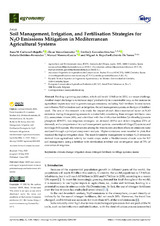Mostrar el registro sencillo del ítem
Soil Management, Irrigation, and Fertilisation Strategies for N2O Emissions Mitigation in Mediterranean Agricultural Systems
| dc.contributor.author | Carbonell, Rosa | |
| dc.contributor.author | Veroz-González, Óscar | |
| dc.contributor.author | González Sánchez, Emilio Jesús | |
| dc.contributor.author | Ordóñez Fernández, Rafaela | |
| dc.contributor.author | Moreno-García, Manuel | |
| dc.contributor.author | Repullo Ruibérriz de Torres, Miguel Ángel | |
| dc.date.accessioned | 2022-06-02T12:14:27Z | |
| dc.date.available | 2022-06-02T12:14:27Z | |
| dc.date.issued | 2022 | |
| dc.identifier.uri | http://hdl.handle.net/10396/23078 | |
| dc.description.abstract | Feeding a growing population, which will reach 10 billion in 2050, is a major challenge. Another major challenge is to increase crops’ productivity in a sustainable way, as the increase in agricultural inputs may lead to greenhouse gas emissions, including N2O fertiliser. Several factors can influence N2O emissions such as irrigation, the soil management system, or the type of fertiliser used. The aim of this research is to study the impact of each above-mentioned factor on N2O emissions during three growing seasons in a maize field, considering three nitrogen fertilisers: urea (U), ammonium nitrate (AN), and a fertiliser with the nitrification inhibitor 3,4-dimethylpyrazole phosphate (DMPP); two irrigation strategies: on demand (100%) and deficit irrigation (75% of demand); and a comparison of two soil management systems: conventional tillage (T) systems and no-tillage (NT) system. The interactions among the three factors and their effects on emissions were analysed through a principal component analysis. Higher emissions were recorded in plots that received the highest irrigation dose. The most favourable management to reduce N2O emissions derived from agricultural activity for maize crops under a Mediterranean climate was the NT soil management, using a fertiliser with nitrification inhibitor and an irrigation dose of 75% of conventional irrigation. | es_ES |
| dc.format.mimetype | application/pdf | es_ES |
| dc.language.iso | eng | es_ES |
| dc.publisher | MDPI | es_ES |
| dc.rights | https://creativecommons.org/licenses/by/4.0/ | es_ES |
| dc.source | Agronomy 12(6), 1349 (2022) | es_ES |
| dc.subject | Climate change | es_ES |
| dc.subject | Irrigation doses | es_ES |
| dc.subject | Nitrogen fertiliser | es_ES |
| dc.subject | No-tillage systems | es_ES |
| dc.subject | Maize | es_ES |
| dc.title | Soil Management, Irrigation, and Fertilisation Strategies for N2O Emissions Mitigation in Mediterranean Agricultural Systems | es_ES |
| dc.type | info:eu-repo/semantics/article | es_ES |
| dc.relation.publisherversion | https://doi.org/10.3390/agronomy12061349 | es_ES |
| dc.relation.projectID | Unión Europea. LIFE17 CCM/ES/000140 | es_ES |
| dc.relation.projectID | Junta de Andalucía. PP.AVA.AVA2019.007 | es_ES |
| dc.rights.accessRights | info:eu-repo/semantics/openAccess | es_ES |

